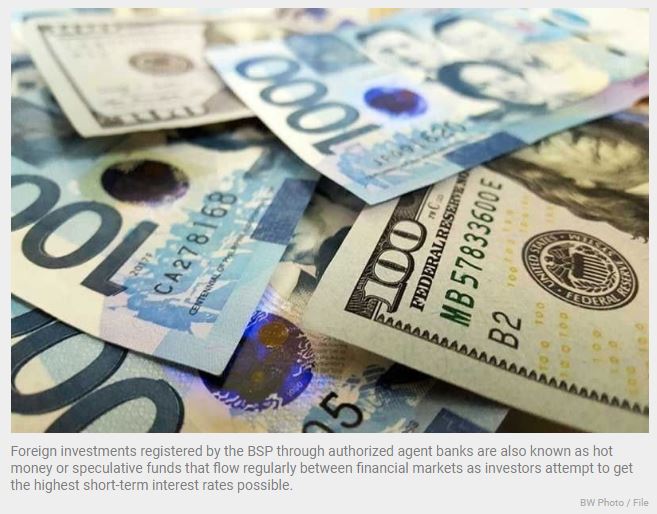Philippines: Hot money exit continues in July
MANILA, Philippines — More speculative funds flowed out of the Philippines than what came in as foreign portfolio investments, resulting in a net outflow for the third straight month in July, according to the Bangko Sentral ng Pilipinas (BSP). Data released by the central bank showed that total foreign investments registered through authorized agent banks logged a net outflow amounting to $103.14 million in July, almost 70 percent lower than the $339.7 million recorded in the same month last year.
Foreign investments registered by the BSP through authorized agent banks are also known as hot money or speculative funds that flow regularly between financial markets as investors attempt to get the highest short-term interest rates possible.
Gross inflows coming from the United Kingdom, the US, Singapore, Hong Kong and Luxembourg slipped by 6.4 percent to $680.73 million in July from $729.77 million in the same month last year.
Data showed the majority of the inflows at 64.8 percent were invested in securities listed on the Philippine Stock Exchange (PSE), particularly in holding firms, property, banks, transport services as well as food, beverage and tobacco.
The balance of 35.2 percent went to investments in peso government securities.
On the other hand, withdrawals of foreign portfolio investments declined by 26.7 percent to $783.87 million in July from $1.07 billion in the same month last year.
Michael Ricafort, chief economist at Rizal Commercial Banking Corp. (RCBC), said that the huge 75-basis-point hike delivered by the BSP Monetary Board during a surprise off-cycle rate-setting meeting last July 14 caused some market volatility as the central bank had initially signaled gradual local rate increases.
Ricafort added that the risk of recession in the US, which is the world’s biggest economy, and continuation of some lockdowns in China – the world’s second biggest economy – resulted in lower prices of global oil and other major global commodities such as wheat.
During his State of the Nation Address (SONA), Ricafort said President Marcos signaled no more lockdowns, which could help support faster economic growth as well as better fiscal and debt management performance, leading to higher sales, earnings and valuations for some listed companies.
Despite the net outflows for three consecutive months, the Philippines had managed to book a net inflow amounting to $625.15 million from January to July this year, reversing the $445.88 million net outflow recorded in the same period last year.
For the seven-month period, gross inflows slipped by almost three percent to $7.82 billion compared to $8.06 billion in the same period last year.
Likewise, gross outflows of speculative funds declined by 15.4 percent to $7.19 billion from $8.5 billion.“For the coming months, if the Russia-Ukraine conflict continues, global oil and commodity prices would linger at multi-year highs, leading to elevated inflation, more aggressive US Fed rate hikes that could lead to risks of economic slowdown or even recession in the US, which is the world’s biggest economy, and thereby could lead to some continued volatility in the global and local financial markets,” Ricafort said.
However, the economist said that any large Retail Treasury Bond (RTB) issuance could lead to some increase in foreign portfolio investments, resulting to a pick up in local financial markets from their respective lows posted in June,” Ricafort continued.
Last year, the Philippines missed its net inflow target of $1.5 billion as it registered a net outflow of speculative funds amounting to $574.46 million, 86.4 percent lower than the $4.24 billion net outflow recorded during the height of the COVID-19 pandemic in 2020.
The central bank expects foreign portfolio investments bouncing back strongly with a net inflow of $4 billion for 2022 and $6.7 billion for 2023.
Source: https://www.philstar.com/business/2022/08/26/2205109/hot-money-exit-continues-july


 English
English




